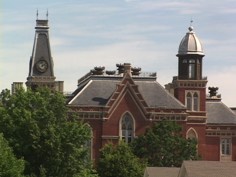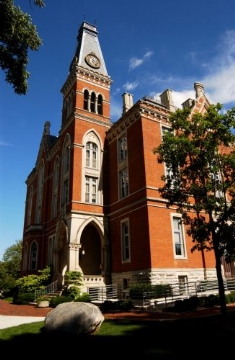DePauw is Model for American University in Kyrgyzstan
January 9, 2000
 January 9, 2000, Greencastle, Ind. - The growth of higher education in the former Soviet Union is getting a boost from halfway around the world -- namely, DePauw University. Representatives of the American University in Kyrgyzstan (pronounced Cur-geez-stan) have been visiting the DePauw campus to learn more about how an American university actually operates. There also may be faculty exchanges.
January 9, 2000, Greencastle, Ind. - The growth of higher education in the former Soviet Union is getting a boost from halfway around the world -- namely, DePauw University. Representatives of the American University in Kyrgyzstan (pronounced Cur-geez-stan) have been visiting the DePauw campus to learn more about how an American university actually operates. There also may be faculty exchanges.
"DePauw is an excellent model for the American University in Kyrgyzstan, especially for the kinds of things you do with the liberal arts curriculum and the size of your library," said Martha Merrill, AUK vice president who visited DePauw on Jan. 5. "AUK is the only university in Kyrgyzstan where students can choose their own schedule, so AUK needs a system of registration," she said. "Admissions is another area. We are the only institution in Kyrgyzstan that does need-based scholarships, so we can learn from how you do financial aid at DePauw."
Camilla Sharshekeeva, AUK provost, came to DePauw last fall, and several AUK librarians will spend a few days later in the spring semester reviewing DePauw's library. AUK is the only institution in Kyrgyzstan to use the Library of Congress system, so the AUK librarians are interested in the resources of DePauw's library.
AUK offers four-year bachelor's degree programs and 12 majors for nearly 700 students. The majority of courses are taught in English. Located in the capital city of Bishkek, AUK was officially opened in 1997 by Hillary Rodham Clinton during a trip to the East Asian nation on the border of China.
"Kyrgyzstan is a country where the per-capita income is $28 per month. Anyone coming from Kyrgyzstan would be amazed at the wealth of DePauw," Merrill said. "DePauw in student size is about three times the size of AUK, but in terms of facilities, DePauw is 40 or 50 times bigger."
Founded by a Kyrgyzstan woman who had never been to the United States, the original intent was for AUK to teach business classes in English. Now, the institution is trying to determine exactly what it means to be an American university.
There are competing visions for AUK, according to Merrill. However, compared to the old Soviet system, it does mean three things:
- A liberal arts curriculum, rather than the Soviet training aimed at preparing students for diplomatic posts.
- More independent work for students, rather
 than an education limited virtually to only classroom work.
than an education limited virtually to only classroom work. - Lack of corruption. Students can not buy their grades, and faculty are not allowed to accept bribes -- unlike other institutions in the region.
There is a real need for curriculum development in the post-Soviet era, Merrill noted. Therefore, AUK faculty members may come to DePauw to view how an undergraduate curriculum works in an American liberal arts university.
DePauw is participating in the AUK project through a grant from the Bureau of Educational and Cultural Affairs of the US State Department that is administered by the Indiana Consortium for International Programs. Other institutions participating are Ball State University, Indiana University-Bloomington, Indiana University-Southeast, Indiana University-Purdue University at Indianapolis and Valparaiso University.
Charles Reafsnyder, associate dean of international programs at Indiana University and program coordinator, said, "DePauw is our model for the administrative plan for AUK." Any DePauw faculty member interested in participating in the AUK project should send his or her vita to Reafsnyder at I.U. and request a faculty development grant. "We especially are looking for professors willing to work with AUK professors on a short-term basis or for a semester. We're not providing teachers for classes, but rather faculty to work with AUK professors, especially in curriculum development," he emphasized.
AUK also needs textbooks, core collection books and syllabi in the social sciences and humanities. The need is particularly great for its psychology department, which AUK is working to strengthen. DePauw's library staff plan to request donations of books from University faculty and staff, but, in the meantime, anyone with materials to donate should contact Kathy M. Davis, director of libraries.
Back